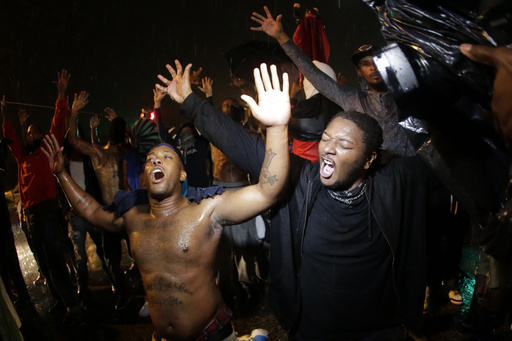Cori Bush transitioned from being a prominent advocate for racial justice to serving two terms as a congresswoman from Missouri, her office adorned with images of families affected by police violence, including one of Michael Brown.
The killing of Brown a decade ago in Ferguson, Missouri, is often regarded as a pivotal event in the racial justice movement in the United States, highlighting longstanding issues such as economic inequality and systemic violence faced by millions.
Activists like Bush have evolved from voicing “Black Lives Matter” to securing positions in various levels of government, successfully advocating for local policies that address problems like prison reform, educational equity, and discrimination based on hairstyle.
Following the 2020 protests, at least 30 states and Washington D.C. have implemented laws aimed at curbing police misconduct. Nevertheless, despite significant activism over the past ten years, many crucial reforms remain unachieved, as noted by several political figures and activists.
Reflecting on the progress made, Bush, who has a background as a community organizer and pastor, stated, “We’re still grappling with issues like militarized policing and police shootings.”
Recent years have seen a transformation in the national dialogue surrounding public safety and racial justice, largely fueled by the new generation of Black activists utilizing technology and social media to rally for change.
Body cameras are becoming standard for police, and the prohibition of practices such as chokeholds has spread across various regions.
In the aftermath of Ferguson, the urgency for reformed approaches to policing has gained momentum, leading to numerous legislative changes throughout the country, with over 150 reforms adopted at different levels.
Bush remarked, “I know that someone’s life was saved” through the sustained activism during the Ferguson protests, emphasizing the need for both internal and external strategies in the movement.
An example of effective leadership is Tishaura Jones, who made history as St. Louis’ first Black female mayor, advocating against a model of policing focused primarily on arresting and incarcerating individuals, instead pushing for improved social services in high-crime neighborhoods.
This effort reflects a growing trend among newly elected leaders across the nation.
Chi Ossé, a member of the New York City Council, shared his motivation for entering politics through the Black Lives Matter movement, emphasizing his unique leadership approach shaped by profound community experiences.
Initially, lawmakers in Washington expressed skepticism towards the Black Lives Matter movement.
For instance, in 2015, Hillary Clinton suggested activists focus more on legislative change. Additionally, a 2016 Democratic Party memo advised caution around Black Lives Matter organizers at public events.
The events in Ferguson marked a significant shift, giving rise to a predominantly grassroots protest movement that often operated through social media channels and connected with a younger audience.
Following the protests sparked by Brown’s death, individuals from diverse backgrounds became motivated to participate in the fight for racial justice.
Bush expressed pride in her efforts to bring the movement into legislative discussions, stating, “I wanted to bring the movement into the House of Representatives.”
As Ferguson activists gained recognition, some were invited to collaborate with the Obama administration on police reform initiatives.
However, under Donald Trump’s presidency, the relationship between the administration and racial justice advocates became strained.
Despite his support for some criminal justice reforms, Trump frequently criticized the movement and attributed worsening race relations to actions by prior administrations.
His controversial responses during the protests following George Floyd’s murder highlighted deeper disconnects between federal leadership and activist goals.
The tragedy of Floyd’s death revitalized discussions around racial justice issues, leading to a surge in public interest regarding police accountability and reform.
In the wake of the uproar that followed Floyd’s killing in 2020, the Democratic Party sought to introduce significant reform measures, such as the George Floyd Justice In Policing Act, which aimed to implement various regulations to improve police accountability.
However, progress stalled in the Senate, highlighting the ongoing divide over reform efforts.
For community leader Ella Jones, her journey into politics began through activism rooted in the Ferguson protests. Commencing her public service career as a protester, she has since been encouraged to take on leadership roles and now serves as a powerful voice for her community.
Wesley Bell, Ferguson’s prosecutor, also emphasized the need for reevaluation of legal protections afforded to police officers, suggesting that these laws hinder effective prosecution.
Following a contentious primary election, Bell emerged victorious over Bush for a congressional seat, leaving her uncertain about her next steps, but adamant about continuing the fight for change.
“The fight is still here, and my boots aren’t far from me,” Bush stated, hinting at her readiness to keep advocating for justice regardless of her political position.


